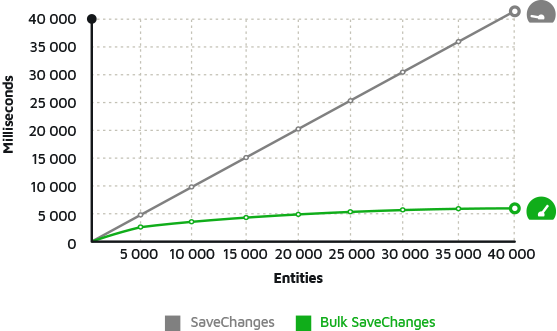Entity Framework BulkSaveChanges Discover who supports this feature
Introduction
BulkSaveChanges allows you to improve EF performance by saving multiple entities with bulk operations.
Why BulkSaveChanges?
For HUGE performance gains, Entity Framework makes one database round-trip for each entity to insert/update/delete.
So if you want to save (add, modify or remove) 10,000 entities, 10,000 database round-trips will be required, which is INSANELY slow. To use BulkSaveChanges, you will need to use a third-party library.
| Operations | 1,000 Entities | 2,000 Entities | 5,000 Entities |
|---|---|---|---|
| BulkSaveChanges | 90 ms | 150 ms | 350 ms |
| SaveChanges | 1,000 ms | 2,000 ms | 5,000 ms |
Google Related Searches
- Entity Framework Bulk Operations
- Entity Framework SaveChanges Performance
- Entity Framework SaveChanges Slow
StackOverflow Related Questions
- Fastest way of inserting many parent and child records
- Bulk Insert in Entity Framework v6.1
- C# & EF: bulkinsert related objects
- Entity framework 6 code first Many to many insert slow
- Insert thousands of many to many links to the DB quickly
- Entity Framework Bulk Insert Throws KeyNotFoundException error
- Bulk insert from a csv file using Entity Framework
// using Z.EntityFramework.Extensions; // Don't forget to include this. // Easy to use context.BulkSaveChanges(); // Easy to customize context.BulkSaveChanges(bulk => bulk.BatchSize = 100);
Supported Libraries
| Library | Type | EF Version | Support | Doc | Features |
|---|---|---|---|---|---|
| Z.EntityFramework.Extensions | PRO | EF6 | < 1 Day | Yes | Bulk SaveChanges Bulk Insert Bulk Update Bulk Delete Bulk Merge |
ZZZ Projects
